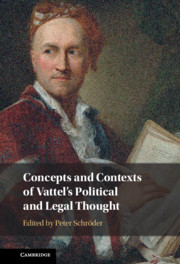Book contents
- Concepts and Contexts of Vattel’s Political and Legal Thought
- Concepts and Contexts of Vattel’s Political and Legal Thought
- Copyright page
- Contents
- Contributors
- Acknowledgements
- Concepts and Contexts of Vattel’s Political and Legal Thought
- Part I Historical and Intellectual Contexts
- 1 In Search of a Nation
- 2 Sovereignty Contested
- 3 The Development of the Law of Nations
- 4 Vattel and the Abbé de Choisy
- 5 Vattel and the Seven Years’ War
- Part II Concepts
- Part III Receptions
- Index
- References
4 - Vattel and the Abbé de Choisy
French Historiography, Piety, and Law of Nations
from Part I - Historical and Intellectual Contexts
Published online by Cambridge University Press: 11 June 2021
- Concepts and Contexts of Vattel’s Political and Legal Thought
- Concepts and Contexts of Vattel’s Political and Legal Thought
- Copyright page
- Contents
- Contributors
- Acknowledgements
- Concepts and Contexts of Vattel’s Political and Legal Thought
- Part I Historical and Intellectual Contexts
- 1 In Search of a Nation
- 2 Sovereignty Contested
- 3 The Development of the Law of Nations
- 4 Vattel and the Abbé de Choisy
- 5 Vattel and the Seven Years’ War
- Part II Concepts
- Part III Receptions
- Index
- References
Summary
In his Law of Nations, Emer de Vattel not only recurs to common examples of pietas and clementia drawn from Roman history, but also refers to more contemporary historical events to frame his vision of the international legal order. Literary exemplarity was a fundamental value for authors like Alberico Gentili and Hugo Grotius, who used classical history as a powerful rhetorical arsenal of arguments to construct customary rules of the law of nations. Such rules were often legal idealisations of the values, myths and virtues of the classical past. Against this traditional framework, Vattel seems no longer under the ideological spell of classical history. Instead, he claims that, in the study of the law of nations, modern historiography should be preferred over ancient literary history. Vattel not only claims that Grotius already gave us plenty of information about the past and that it is time to move on to more contemporary and urgent questions; but also warns that indulgence in antiquarian arguments produces a mere ‘parade of erudition’ that alienates readers (LN, preface 19–20).
- Type
- Chapter
- Information
- Publisher: Cambridge University PressPrint publication year: 2021



